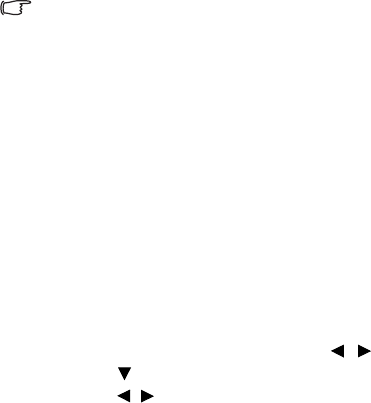
Operation
34
The picture can only be navigated after the picture is magnified. You can further magnify the
picture while searching for details.
Selecting the aspect ratio
The 'aspect ratio' is the ratio of the image width to the image height. Most analog TV and
computers are in 4:3 ratio,and digital TV and DVDs are usually in 16:9 or 16:10 ratio.
With the advent of digital signal processing, digital display devices like this projector can
dynamically stretch and scale the image output to a different aspect than that of the image
input signal.
To change the projected image ratio (no matter what aspect the source is):
• Using the remote control
1. Press ASPECT to show the current setting.
2. Press ASPECT repeatedly to select an aspect ratio to suit the format of the video
signal and
your display requirements.
•Using the OSD menu
1. Press MENU/EXIT and then press / until the DISPLAY menu is highlighted.
2. Press
to highlight Aspect Ratio.
3. Press / to select an aspect ratio to suit the format of the video signal and your
display requirements.
About the aspect ratio
1. Auto: Scales an image proportionally to fit the projector's native resolution in its
horizontal or vertical width. This is suitable for the incoming image which is neither
in 4:3 nor 16:9 and you want to make most use of the screen without altering the
image's aspect ratio.
2.
Real: The image is projected as its original resolution, and resized to fit within the
display area. For input signals with lower resolutions, the projected image will display
smaller than if resized to full screen. You could adjust the zoom setting or move the
projector towards the screen to increase the image size if necessary. You may also
need to refocus the projector after making these adjustments.
3. 4:3: Scales an image so that it is displayed in the center of the screen with a 4:3
aspect ratio. This is most suitable for 4:3 images like computer monitors, standard
definition TV and 4:3 aspect DVD movies, as it displays them without aspect
alteration.
4. 16:9: Scales an image so that it is displayed in the center of the screen with a 16:9
aspect ratio. This is most suitable for images which are already in a 16:9 aspect, like
high definition TV, as it displays them without aspect alteration.
5. 16:10: Scales an image so that it is displayed in the center of the screen with a 16:10
aspect ratio. This is most suitable for images which are already in a 16:10 aspect, like
high definition TV, as it displays them with out aspect alteration.


















